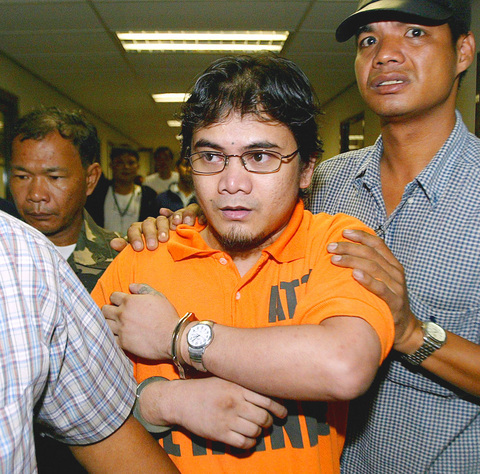A Philippine court yesterday sentenced to death an Indonesian and two Filipino Muslim militants for their roles in the bombing of a Manila bus in February.
The Feb. 14 attack killed four people and wounded scores of others. The al-Qaeda-linked Abu Sayyaf group had claimed responsibility for the bombing, as well as two other bomb attacks in two southern towns on the same day, in retaliation for a military offensive against militants.
The Indonesian, who goes by one name, Rohmat, is a confessed member of the regional terror group Jemaah Islamiyah who was captured in March in the southern Philippines, where authorities say several dozen Indonesian militants have been training local guerrillas in bomb-making and plotting attacks.

PHOTO: EPA
Rohmat pleaded not guilty, while two Filipino co-accused, Gamal Baharan and Abu Khalil Trinidad, admitted to multiple murder charges.
Prosecutors have dropped charges against another suspect, Gappal Bannah, an Abu Sayyaf member, after he became a state witness.
Rohmat said during his arraignment in April that he had nothing to do with the bombing because he was in the Philippines' southern Mindanao region at the time. But he claimed he provided training in weapons, tactics and map reading to the three other suspects.
"This decision convicting all the accused of the complex crime of multiple murder, murder, and frustrated murder, was rendered after thoroughly and painstakingly evaluating the evidence presented, the most significant of which included the ... voluntary pleas of accused Baharan and Trinidad [and] the clear and categorical testimony of accused-turned state witness [Bannah]," Judge Marissa Guillen of the Makati City Regional Trial Court said in a statement.
Prosecutors also charged Abu Sayyaf chiefs Khadaffy Janjalani and Abu Sulaiman for the bus bombing. The two leaders remain at large.
During the five-month trial, one of the witnesses, a bus conductor, identified Baharan and Trinidad as passengers who left the bus in a hurry shortly before the blast, state prosecutor Emmanuel Velasco said.

PRECARIOUS RELATIONS: Commentators in Saudi Arabia accuse the UAE of growing too bold, backing forces at odds with Saudi interests in various conflicts A Saudi Arabian media campaign targeting the United Arab Emirates (UAE) has deepened the Gulf’s worst row in years, stoking fears of a damaging fall-out in the financial heart of the Middle East. Fiery accusations of rights abuses and betrayal have circulated for weeks in state-run and social media after a brief conflict in Yemen, where Saudi airstrikes quelled an offensive by UAE-backed separatists. The United Arab Emirates is “investing in chaos and supporting secessionists” from Libya to Yemen and the Horn of Africa, Saudi Arabia’s al-Ekhbariya TV charged in a report this week. Such invective has been unheard of

US President Donald Trump on Saturday warned Canada that if it concludes a trade deal with China, he would impose a 100 percent tariff on all goods coming over the border. Relations between the US and its northern neighbor have been rocky since Trump returned to the White House a year ago, with spats over trade and Canadian Prime Minister Mark Carney decrying a “rupture” in the US-led global order. During a visit to Beijing earlier this month, Carney hailed a “new strategic partnership” with China that resulted in a “preliminary, but landmark trade agreement” to reduce tariffs — but

SCAM CLAMPDOWN: About 130 South Korean scam suspects have been sent home since October last year, and 60 more are still waiting for repatriation Dozens of South Koreans allegedly involved in online scams in Cambodia were yesterday returned to South Korea to face investigations in what was the largest group repatriation of Korean criminal suspects from abroad. The 73 South Korean suspects allegedly scammed fellow Koreans out of 48.6 billion won (US$33 million), South Korea said. Upon arrival in South Korea’s Incheon International Airport aboard a chartered plane, the suspects — 65 men and eight women — were sent to police stations. Local TV footage showed the suspects, in handcuffs and wearing masks, being escorted by police officers and boarding buses. They were among about 260 South

Chinese President Xi Jinping’s (習近平) purge of his most senior general is driven by his effort to both secure “total control” of his military and root out corruption, US Ambassador to China David Perdue said told Bloomberg Television yesterday. The probe into Zhang Youxia (張又俠), Xi’s second-in-command, announced over the weekend, is a “major development,” Perdue said, citing the family connections the vice chair of China’s apex military commission has with Xi. Chinese authorities said Zhang was being investigated for suspected serious discipline and law violations, without disclosing further details. “I take him at his word that there’s a corruption effort under